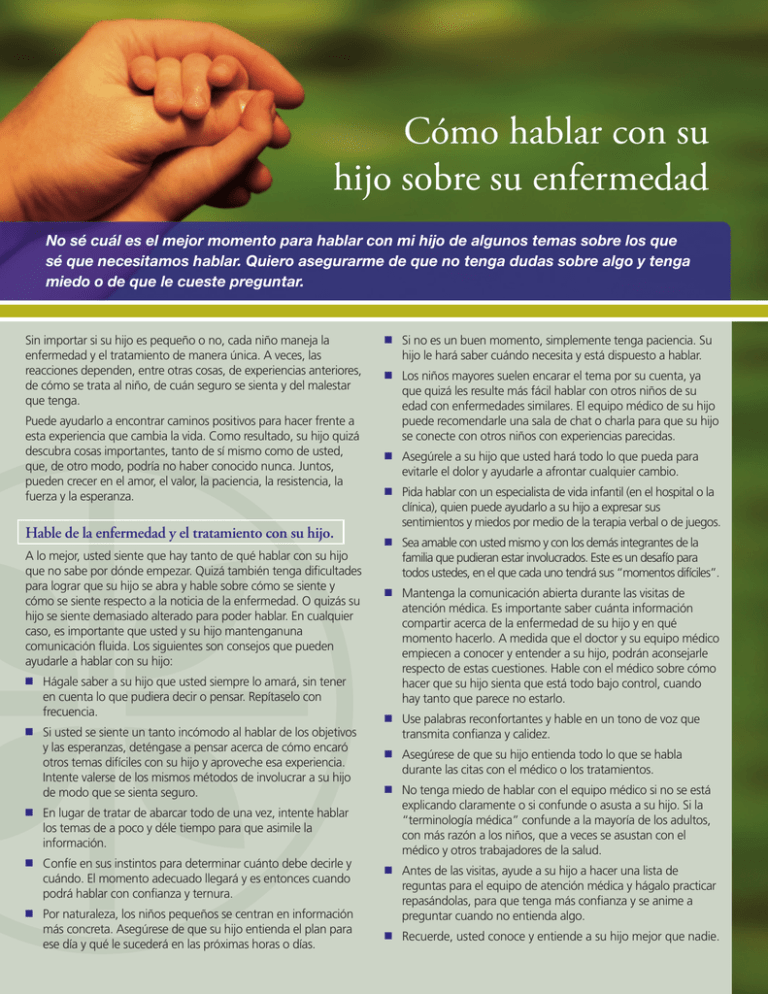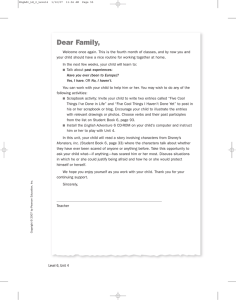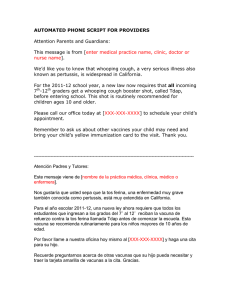Hablando con su Hijo Sobre su Enfermedad
Anuncio

Cómo hablar con su hijo sobre su enfermedad No sé cuál es el mejor momento para hablar con mi hijo de algunos temas sobre los que sé que necesitamos hablar. Quiero asegurarme de que no tenga dudas sobre algo y tenga miedo o de que le cueste preguntar. Sin importar si su hijo es pequeño o no, cada niño maneja la enfermedad y el tratamiento de manera única. A veces, las reacciones dependen, entre otras cosas, de experiencias anteriores, de cómo se trata al niño, de cuán seguro se sienta y del malestar que tenga. Puede ayudarlo a encontrar caminos positivos para hacer frente a esta experiencia que cambia la vida. Como resultado, su hijo quizá descubra cosas importantes, tanto de sí mismo como de usted, que, de otro modo, podría no haber conocido nunca. Juntos, pueden crecer en el amor, el valor, la paciencia, la resistencia, la fuerza y la esperanza. Hable de la enfermedad y el tratamiento con su hijo. A lo mejor, usted siente que hay tanto de qué hablar con su hijo que no sabe por dónde empezar. Quizá también tenga dificultades para lograr que su hijo se abra y hable sobre cómo se siente y cómo se siente respecto a la noticia de la enfermedad. O quizás su hijo se siente demasiado alterado para poder hablar. En cualquier caso, es importante que usted y su hijo mantenganuna comunicación fluida. Los siguientes son consejos que pueden ayudarle a hablar con su hijo: ■■ Hágale saber a su hijo que usted siempre lo amará, sin tener en cuenta lo que pudiera decir o pensar. Repítaselo con frecuencia. ■■ Si usted se siente un tanto incómodo al hablar de los objetivos y las esperanzas, deténgase a pensar acerca de cómo encaró otros temas difíciles con su hijo y aproveche esa experiencia. Intente valerse de los mismos métodos de involucrar a su hijo de modo que se sienta seguro. ■■ En lugar de tratar de abarcar todo de una vez, intente hablar los temas de a poco y déle tiempo para que asimile la información. ■■ Confíe en sus instintos para determinar cuánto debe decirle y cuándo. El momento adecuado llegará y es entonces cuando podrá hablar con confianza y ternura. ■■ Por naturaleza, los niños pequeños se centran en información más concreta. Asegúrese de que su hijo entienda el plan para ese día y qué le sucederá en las próximas horas o días. ■■ Si no es un buen momento, simplemente tenga paciencia. Su hijo le hará saber cuándo necesita y está dispuesto a hablar. ■■ Los niños mayores suelen encarar el tema por su cuenta, ya que quizá les resulte más fácil hablar con otros niños de su edad con enfermedades similares. El equipo médico de su hijo puede recomendarle una sala de chat o charla para que su hijo se conecte con otros niños con experiencias parecidas. ■■ Asegúrele a su hijo que usted hará todo lo que pueda para evitarle el dolor y ayudarle a afrontar cualquier cambio. ■■ Pida hablar con un especialista de vida infantil (en el hospital o la clínica), quien puede ayudarlo a su hijo a expresar sus sentimientos y miedos por medio de la terapia verbal o de juegos. ■■ Sea amable con usted mismo y con los demás integrantes de la familia que pudieran estar involucrados. Este es un desafío para todos ustedes, en el que cada uno tendrá sus “momentos difíciles”. ■■ Mantenga la comunicación abierta durante las visitas de atención médica. Es importante saber cuánta información compartir acerca de la enfermedad de su hijo y en qué momento hacerlo. A medida que el doctor y su equipo médico empiecen a conocer y entender a su hijo, podrán aconsejarle respecto de estas cuestiones. Hable con el médico sobre cómo hacer que su hijo sienta que está todo bajo control, cuando hay tanto que parece no estarlo. ■■ Use palabras reconfortantes y hable en un tono de voz que transmita confianza y calidez. ■■ Asegúrese de que su hijo entienda todo lo que se habla durante las citas con el médico o los tratamientos. ■■ No tenga miedo de hablar con el equipo médico si no se está explicando claramente o si confunde o asusta a su hijo. Si la “terminología médica” confunde a la mayoría de los adultos, con más razón a los niños, que a veces se asustan con el médico y otros trabajadores de la salud. ■■ Antes de las visitas, ayude a su hijo a hacer una lista de reguntas para el equipo de atención médica y hágalo practicar repasándolas, para que tenga más confianza y se anime a preguntar cuando no entienda algo. ■■ Recuerde, usted conoce y entiende a su hijo mejor que nadie. Talking with Your Child about His or Her Illness I don’t know when the best time is to talk to my child about some of the things I know we need to discuss. I want to make sure she isn’t wondering about something and is afraid or having a hard time asking about it. No matter how young or old a child is, each child handles illness and treatment in unique ways. Reactions can be influenced by past experiences, how the child is treated, how safe he or she feels, how much discomfort he or she has, and other issues. You can help your child find ways to cope with this life-changing experience in a positive way. As a result, your child may discover important things—about himself or herself, as well as about you — that might otherwise never have become known. Together, you can grow in love, courage, patience, resiliency, strength and hope. Talk with your child about the illness and treatment. You may feel like there is so much to talk about with your child that you don’t know where to begin. You may also be having difficulty getting your child to open up and share how he or she is feeling and coping with the news about the illness. Perhaps he or she feels too upset to do much talking. Whatever the case, it is important that you and your child keep the lines of communication open. The following are tips that may help you talk with your child: ■■ Let your child know you will always love him or her no matter what he or she might say or think. Repeat this often. ■■ If you don’t feel completely comfortable talking about goals and hopes, take a few moments to think about how you have talked about other difficult issues with your child and draw upon that experience. Try to use those same ways to engage your child so he or she will feel safe. ■■ Rather than trying to cover everything all at once, try discussing things in smaller bits, giving your child time to take in the information. ■■ Trust your instincts to help you determine how much to say and when. The right moments will appear and when they do, you can talk with your child lovingly and confidently. ■■ ■■ Young children naturally focus on more concrete information. Make sure your child understands the plan for today and what’s going to happen in the next few hours or next couple of days. ■■ Older kids often try to go it alone. They may find it easier to talk to peers with similar medical conditions. Talk to your child’s medical team about appropriate chat rooms and making contact with other children with similar experiences. ■■ Reassure your child that you will do whatever you can to prevent pain and help him or her cope with any changes. ■■ Ask to meet with a child life specialist (at the hospital or clinic), who can help your child talk about feelings and fears, through conversation and/or play therapy. ■■ Be kind to yourself and to other family members who may be involved. This is a challenging time for all of you and each of you will have your “difficult moments” along the way. ■■ Keep communication open during health care visits. How much and when to share information regarding your child’s condition is an important topic. Ask your doctor and the team caring for your child for guidance as they begin to know and understand your child. Discuss ways to help your child feel in control at a time when so much seems beyond control. ■■ Use comforting language and a tone of voice that expresses confidence and warmth. ■■ Be sure your child understands everything that is discussed during doctor’s appointments or treatments. ■■ Don’t be afraid to give the healthcare team feedback if they are not getting through or are confusing or frightening your child. “Medical talk” confuses most adults, let alone children who may be scared by their doctor and other health care workers. ■■ Help your child prepare a list of questions for the healthcare team before visits and practice going through the questions to help your child become confident about speaking up when something is not understood. ■■ Remember, you know and understand your child better than anyone else. If your timing is off, just be patient. Your child will let you in when he or she is both able to talk and needs to do so. FOR MORE INFORMATION CaringInfo © 2016 National Hospice and Palliative Care Organization CaringInfo · www.caringinfo.org · [email protected] · 800.658.8898 · 877.658.8896 (Spanish) Partnership for Parents · www.partnershipforparents.org · www.padrescompadres.org




